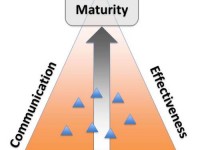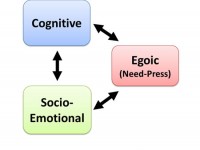Over the last few months I regularly stumbled over clients struggling with the same question: 'how can we create groups that can learn from mistakes faster, more efficiently, and more consistently than competitors do?'. The background of this question is the simple observation that a lot of groups systematically underperform. They do not make good decisions and they do not solve complex problems in a collaborative way. As the saying goes, two heads are better than two. If so, then three heads should be better than two, and four better still. The belief is that different people take note of different 'parts', and if those parts are properly aggregated, they will lead the group to know more (and better) than any individual. Reality, however, teaches us that this rarely happens. Groups often fail to live up to their potential as decision making bodies. Instead of aggregating the knowledge and wisdom of their members, they end up making bigger errors than individuals would. The scientific community identified two main reasons why group errors occur. The first is that group members often receive incorrect signals from other members. The second involves reputational pressures, which lead people to silence themselves or change their views... Read More...
Author: Otto Laske
I am the founder and director of IDM, the Interdevelopmental Institute. My background is in philosophy, psychology, consulting, and coaching based on developmental theory to which I have mightily contributed myself. See the blogs at www.interdevelopmentals.org.
Laske – Cartmel 2015 Interview Series I
First part of the Laske - Cartmel Interview Series Read More...
Obituary for Roy Bhaskar
This article is a reflection on the loss the dialectical tradition has incurred through Bhaskar’s early death. In particular, I spell out how his work contributed to CDF, and mention his utter humility as a person. Roy Bhaskar’s Premature Death: A Profound Loss for the Tradition of Dialectical Thinking Read More...
Reflection on the Western rather than Asian character of DTF and the need for research to make it more Asian or acceptable in Asia
By Otto Laske - At the end of the present introductory course on dialectic I wrote to my students the following note: I should mention one great omission from the introductory class which will make the use of the Dialectical Thinking Framework (DTF) more complex but also more deep. We never discussed the issue of “contrasts”, or better of “alternative” thought forms. By this I mean that when scoring we use contrasts to narrow the choice of the thought form to be scored, by thinking of what alternative scorings could be. These could fall into the same class, in which case the overall scoring result would not change (since we are scoring moments of dialectic, not individual thought forms), but they could also fall into a different moment/class, and this could shift the resulting profile. Investigating the Thought Form table further, we realize how “Western” the presentation of thought forms is: we speak of “classes” of thought forms which is something Asians would not find easy since they are used to grouping things based on similarity relationships rather than categories or classes, and thus following logical rules about attribution to a class. Being critical of the table of thought forms... Read More...
Introduction to the three CDF Dimensions (Self-Study)
This course introduces students to a widely acclaimed, holistic perspective on both individuals and teams. It is an overview course focused the three perspectives in which CDF-users view clients: the social-emotional, cognitive, and psychological one. Insight into these dimensions stems from decades of validated research since the 1970s but has not been widely taught in a unified fashion. In the course, emphasis is placed as well on the interrelationships between the three dimensions since they closely interact in coaching as well as consulting. Based on this course, students become eligible for all other CDF courses. Read more Read More...
Introduction to Developmental Work with Teams
This course introduces team leaders and team coaches to fundamentally new ways of understanding the nature and behavior of teams, with the goal of re-shaping team dynamics. In the course, two main processes are distinguished: interpersonal and task process. Their balance is thought to define team maturity. The purpose of the course is twofold: to change coaches’ perception of teams based on social-emotional insight, and to give them new, dialectical, dialog tools for supporting team members’ interpersonal process and for strengthening their task process. Team maturity and different modes of team leadership are central course topics. The methodology taught goes far beyond purely the behavioral approaches now used, focusing on team members’ developmentally shaped frame of reference on account of which they collaborate in the team and view the organization they art part of the way they do. Students will be asked to submit a concise description of a team they are working with; their descriptions will provide the focus around which CDF tools are introduced and practiced in class. The study cohort itself will serve as a team to practice on. Read more Read More...

